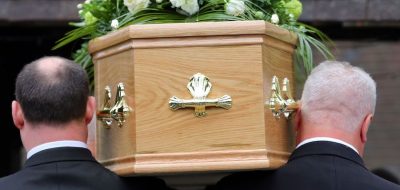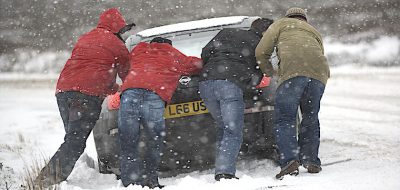Exam worries resurface

Clown crisis grips Ireland

Gideons changes its name

Gideons, one of the world's most famous Christian names, is undergoing a name change in a bid to "better reflect" the organisation it is today.
Since the 1950s, Leicestershire-based Gideons UK has introduced tens of thousands of people to Christianity through the 800,000 bibles it places in schools, hotels, hospitals, prisons, and many other areas of everyday life every year.
But it believes a name change is essential if it is to continue to be relevant in a modern world and build on the appetite that exists in the world to learn more about Jesus. So, with immediate effect, the organisation will be known as Good News for Everyone.
Key changes that have influenced its decision include:
- Google searches for ‘prayer’ growing by 50% during the pandemic;
- Five million people watching the archbishop of Canterbury deliver a message of hope online – the single largest congregation in history;
- And UK churches seeing a rise in engagement through online services and support.
“We feel this change is in keeping with God’s will for the organisation and there has been overwhelming support from our members," commented Iain Marr, executive director. " We are excited about the future and the new opportunities we have to share the Good News.”
TV's galvanised my faith

Throughout the UK lockdowns, I often spent my evenings lying down in the house – trusting in God’s care. Suspended in that strange season, I buried my nose in more books, consumed more online productions and viewed more TV than ever before.
Now as the night’s draw in and a new sofa season is rapidly approaching, I sense broadcasters tempting me with their creative offerings once again. But before I recline with the remote, let me tell you what the telly has taught me about God:
Visualising Deconstruction: The Repair Shop (BBC)
Observing the skilled experts of The Repair Shop thoughtfully assess, lovingly deconstruct and carefully conserve all manner of precious family heirlooms is quite something. With patience and courage, they undertake the lengthy surgical deconstruction process. They remove every single shard of rust, every fleck of baked on glue, varnish, paint, oil or grime. All carefully executed without inflicting further damage on the already fragile artefact. Every trace of these ancient contaminants must be removed as they hold the potential to undermine the strength, structure and function of the object. Original materials which have been lost to the sands of time, or become too delicate, are either replicated or reinforced.
The BBC team is eager, excited and engaged. Its conservation work generates joy. Watching the individuals at work, wholly immersed in a dedicated campaign of total restoration, forges a deeper understanding of how my Heavenly Father is at work in me. I’ve learned that God too is a cheerful, diligent craftsman who delights in the work of His hands. Every aspect of my life is being lovingly restored by Him.
Understanding Bounded spaces: Gardeners’ World (BBC)
Watching expert gardener, Monty Don, working in his own garden is an exercise in both beauty and peril. His garden, Long Meadow, seems idyllic. There is shade and sun; friendly dogs; a writing garden; a cosy shed. It’s worth noting that this garden, as in the *garden of Eden described in the Bible's Book of Genesis, is a bounded space.
I’ve thought a lot about bounded spaces lately. This is mostly down to Walter. He lives under my neighbour’s shed. I kid you not. Walter the Weasel is furry, cute and deadly. A cunning agent of chaos and destruction. A vicious predator, Walter can easily kill a creature twice his own size. Lately he has begun chewing holes in the base of the boundary fence, sneaking in, and helping himself to the unsuspecting bird life in my garden. I’m not happy about the vandalised fence and the slaughtered birds. If the holes are blocked up he chews a new one. Walter can be held at bay but he can’t be kept out.
Much human effort goes into creating bounded spaces of both the physical and abstract variety. In our primal quest for safety and certainty, our guts instinctively communicate that there’s something that needs to be kept out. So we build boxes. And bigger boxes. We build businesses. And we build belief systems. But here’s the thing, even the sagely Monty Don is unable to keep agents of destruction out of his bounded spaces. He can only hold them at bay. Sometimes pests and pestilence utterly destroy the plant he’s nurturing, invoking an inner savage with the secateurs.
And if God’s perfect garden, a holy bounded space, was breached (by design or default) by an agent of chaos and destruction (a snake) what chance have I against such foes? I’ve learned that no matter how secure my bounded physical or abstract spaces seem, my perimeters are permeable. Metaphorical weasels may be held at bay, but because weasels are so very weasely, they will surely weasel their way in. I need not fear them; they’re not dragons; they’re just weasels. I must expect them. I must not let them blow me off course. I must stand against them. It would be naïve of me to think otherwise.
Valuing Journalism: Endeavour (ITV)
The dynamics between journalism and law enforcement can be tense.
In the fictional crime drama, Endeavour, the tension is mostly played out between two central characters. Newspaper editor, Dorothea Frazil, (Abigail Thaw) works to pursue and publish the truth. DC Endeavour Morse (Shaun Evans) works to prosecute the perpetrator. Both strive to hold the powerful to account, both play their respective parts as citizens in a nation under law. Nowadays journalists and ‘the media’ are frequently despised and subjected to considerable criticism. I’m often disheartened by this, but when I study Abigail Thaw’s character it renews my hope in the value of good journalism. Through her, God reminds me that He’s in the business of recruiting outliers to become scribes, prophets, truth-tellers and jobbing journalists. I think God gets behind writers, and the act of writing, because it’s one of the ways He brings things into the light and gives a voice to the voiceless.
Experiencing Gratitude: The Victoria Slum (BBC)
This fly-on-the-wall series follows a group of modern people transported to a replica Victorian slum deep in the bowels of London’s East End. I expected to be more prepared for the scummy horrors of slum dwelling. My personal narrative casts me as an unspoilt, humble, working-class northerner. But while viewing this series God revealed a shed full of muttering ingratitude, generously daubed with a splodge of low-level resentment. God insisted that I let this go. And so I did. Now I’m grateful that I grew up with a freezing brick privy at the end of our yard because it was private. I’m grateful for that terraced house because it wasn’t occupied by the whole street. I’m grateful for that cold bed because I didn’t have to share it. I’m grateful for that hand-me-down doll because I could play instead of work. I’m grateful for that wafer-thin slice of Hovis bread because I got one every day. I’m grateful that I was the last child dunked into that shared weekly bathwater, because it was clean(ish) and warm(ish). I’m grateful for my ancestors, who grafted in mines and mills because their past investment rewarded me with a future. I’m grateful to my Heavenly Father, more than ever before, because he has revealed more of His goodness towards me.
Closing thoughts...
As the liberty and liveliness of summer gives way to the warm embrace of autumn, consider the leaves changing and falling. Observe the drifting clouds; slow your thoughts down to the subtle speed of the sky; and watch as night gently falls. Though dark evenings will soon envelop us, God can communicate through the stillness, if we’re open to hearing from Him.
If you do only one thing, Allow yourself to lie down in the evening, and be open to receiving God’s care for you.

Val Fraser is a well-respected freelance journalist based in the north-west of England.
Back... with a bang

And finally, he’s about to turn up. Still, better late than never – and given the sad reasons for his delay, let’s forgive 007 for his tardiness on this occasion!
I don’t know about you, but I have just booked my ticket for Daniel Craig's latest outing as James Bond in No Time To Die? I am going at midnight on 30 September to see it on the super-sized screen in Milton Keynes. And I can't wait.
In the meantime, I am about to do something that I don't think Bond has ever done. For never – in print or on-screen – has Bond stepped into or crawled his way out of a minefield. Honest. However – allow me to take that step. Every time a new Bond film comes out, I take the opportunity to go back and binge-watch the films that have come before. I am such a massive fan of the franchise and it’s always great to go back and relive some many great adventures. I have just immersed myself in all the Daniel Craig films – and have loved doing so.
But which are the best and worst Bond films, and who is the best Bond?
Such questions cause fans like me to stay up late into the night debating the various merits of Moore, Dalton, Bronson, Lazenby and Sean Connery. Well – for what it's worth, from best to worst here’s my list. It's highly likely you will disagree with some, or all, of what I write from here. But that's okay. The only thing that matters is I leave you shaken and stirred.
In order of priority, here are my favourite 10 Bond films:
- On Her Majesty's Secret Service: the film follows the book – and what an ending. I still cry. Don’t tell me George Lazenby can’t act when you see that final scene! The best of the series for many, many fans.
- Skyfall: Craig really captures the Bond of the books and does a great job throughout this film. The finale is simply stunning.
- Casino Royale (the Craig version): this introduced Craig as 007 and brilliantly rebooted the series.
- Spectre: Craig again but a brilliant continuation of the story and the largest explosion ever in a Bond.
- From Russia With Love: Connery at his best; a truly gripping espionage story.
- Goldfinger: "No Mr Bond I am expecting you to die." A classic.
- Dr No: One of the best Bond villains and one of the best leading ladies.
- The Living Daylights: Timothy Dalton is mean, moody and magnificent.
- Licence to Kill: A personal mission for Bond, and boy, does he go for it!
- For Your Eyes Only: The most Fleming-like of all the Roger Moore films, and all the better for it.
And for anyone interested in reading what Daniel Craig thinks about reaching the end of the road as James Bond, look out for the new edition of Sorted magazine, which will be available in newsagents from 15 October. The magazine is carrying an exclusive interview with Daniel Craig, in which he talks candidly about life after Bond.

Andy Godfrey is Sorted's film critic and a leading member of the Mark Kermode Appreciation Society.
The electrifying Kuga

Men: don't die of ignorance

Up to 20% of all males die before they reach the age of 65 from preventable medical conditions.
Being “too busy”, work commitments and overall stigma regarding men’s health are just some of the anecdotal reasons that men are putting off visiting their doctor. However, conditions ranging from cancer to depression are going unnoticed and undiagnosed in men.
Earim Chaudry, Medical Director of Manual, the men’s health platform, believes all men should seek expert advice long before they detect any serious medical problems. Among those conditions he urges men to address are:
Urination difficulties
Difficulty urinating, or pain when urinating could be a sign of prostate disease or cancer, which shouldn’t be ignored. When the prostate is enlarged, it can press on the urethra (the tube that carries urine from the bladder) which can make it difficult to pass urine. Prostate cancer is the most common type of cancer for men in the UK, according to the NHS. This type of cancer also develops slowly, which means it can go undetected for many years. You might notice an increased need to urinate, straining while you urinate or the feeling as though your bladder isn’t fully emptied. While these symptoms don’t necessarily mean you have prostate cancer, it is important to visit your GP as a precaution.
Changes in moles
It is important to get your moles checked regularly, and any changes in size, colour or shape should be reported to your GP. Skin cancer is one of the most common cancers in the world, and currently affects more men than women in the UK, with over 147,000 new cases each year. The two most common types of non-melanoma skin cancer are:
- Basal cell carcinoma (also known as a rodent ulcer) starts in the cells lining the bottom of the epidermis and accounts for about 75 in every 100 skin cancers
- Squamous cell carcinoma starts in the cells lining the top of the epidermis and accounts for about 20 in every 100 skin cancers
While most moles are not the result of skin cancer, it is important to check your body for any new changes. Sings to look out for include the ABCDE rule: asymmetry, border raises, colour change, diameter changes and elevation changes.
Unusual lumps
While many cancers develop with age, testicular cancer is usually diagnosed in younger men from ages 15 to 49, with around 2,300 new cases every year. Symptoms include new lumps on either of the testicles, which can either be painful or painless or any changes to the shape or feel of the testicle. It is also important to recognise what feels normal to you, to monitor any changes in the shape. If you notice any changes or unusual lumps, be sure to get this checked with your GP. It is also one of the most treatable cancers in the UK, with 99% of men surviving for a year or more after being diagnosed.
Chest pains
Many men ignore pains in their chest and mistake this as either indigestion or lack of physical activity, however, this can be a symptom of either heart disease or heart failure. Heart disease is the leading cause of death for men in the UK, with 119,000 men having a heart attack each year, compared to 69,000 women. Chest pain should always be monitored, as this could be a symptom of heart failure or a heart attack. Lifestyle changes, as well as medicines, can control heart failure and reduce the chances of a heart attack occurring.
Low mood and personality changes
Changes in mood can be an early sign of depression. Suicide is the biggest single killer of men under 45, and males are three times more likely to commit suicide than women, according to official government data. Whilst a low mood doesn’t always result in depression, it is important to recognise the risk factors. Changes in personality, or becoming withdrawn, can also be a sign and should be taken very seriously. Other signs of depression that men need to look out for:
- Feeling guilt or shame
- Giving away personal items or belongings
- Saying goodbye to people
- Looking for ways to harm themselves or others
- Feeling like a burden to others
- Extreme mood swings
- Loss of interest or pleasure in activities that used to be enjoyed

Too many men have buried their heads in the sand for far too long as far as their health is concerned. This has seen lives cut short – and families devastated unnecessarily, all because men haven't listened to their bodies.
We urge all readers to take their health very seriously and heed Earim Chaudry's call to action. It's very simple,: if something doesn't feel right – get it checked out.
Don't be a dipstick driver

Perfect for ‘petrolheadonists’

If you are kicking your heels on Saturday or Sunday – and you are an unapologetic ‘petrolhead’ – Hertfordshire may just be the destination for you!
What organisers are dubbing a “celebration of all things automotive” is taking place at Knebworth House in Stevenage. And with more than 1,000 cars on show at Petrolheadonism Live, ranging from Supercars, Classics, Americana, Highly Modified and much more, it’s likely the event will have something for everyone (providing they can differentiate between ‘torque’ and ‘talk’).
A Hypercar Enclosure will be showcasing a selection of exclusive cars worth over £50 million, including the Koenegsigg Regera worth £3.5m (pictured, below), the Mercedes 300SL Gullwing worth £4m, and a Ferrari F50 worth £1.65m. Other highlights include the Lewis Hamilton Petronas FI simulator, a Superbike enclosure, Dream Rides, and special guest of honour, Richard Rawlings (pictured, above) of Gas Monkey Garage and Fast ‘n’ Loud TV fame.
For anyone contemplating bringing the kids with them, free entrance to the Knebworth adventure playground beckons. Here the children can enjoy a zip wire, dinosaur trail with 70 life-sized dinosaurs, a maze, water features and much more.
For more information about tickets and prices, please click here.

The question of integrity


